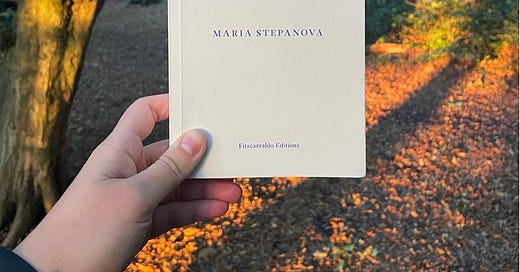Welcome to Bookmarked, a weekly newsletter following my journey as I read one book from every country. If you like the sound of my project, I’d love it if you shared Bookmarked with a friend.
Shortlisted for the International Booker Prize this year, In Memory of Memory blends memoir, literary criticism, essay, and fiction to tell the story of author Maria Stepanova’s genealogy, going back through four generations of Russian Jews.
The book opens with the death of Stepanova’s aunt Galya in 2015. Sifting through the contents of Galya’s Moscow apartment, a veritable archive of Russia’s Soviet era, sets Stepanova off on a mission to understand her family’s past. Throughout the book, which for the most part moves chronologically, Stepanova philosophises about memory, discussing the things we decide are worth preserving as well as the line between feeling connected to passed down memories and misappropriating them.
Month after month I transcribed my family’s letters and documents, poring over the microscopic handwriting, the rapid accounts of long-dead conversations. I began to understand them better and love them more. I wondered whether imitation often ended in this way… I… carefully copying out the commas and little mistakes of my ancestors, was no longer able to see the line that divided their lives from mine.
Over the course of her book, Stepanova explores the lives of her parents, grandparents, great uncles, and cousins who lived through the Second World War, the Russian Civil War, and the Siege of Leningrad. She reads their letters, visits their homes, and looks them up in Russia’s archives. At times, she situates her own genealogy in a broader historical context. Sometimes she also draws on the works of intellectuals, writers, and artists; from Susan Sontag to Rembrandt and Boris Pasternak.
One of the most interesting parts of the book involves Stepanova recounting a conversation with her father in which he asks her not to reproduce his letters in her book. “I can’t bear to think that someone will read those letters and think that’s what I am,” he says. This leads Stepanova to think about her deceased relatives, whose letters she cannot get permission to use but which she does nonetheless. “The dead have no rights,” Stepanova writes, “their property and the circumstances of their fate can be used by anyone and in any way.” For me, it is in this section of the book that Stepanova at her best: untangling a messy narrative that doesn’t belong to her while also questioning her right to do so.
At 500 pages, In Memory of Memory is a long book that meanders and digresses often. At points, the energy of Stepanova’s cross-genre style reminded me of Maggie Nelson’s writing but at other times, I felt my attention drift. I would have probably enjoyed the book more if it were a little shorter, or organised more neatly into essays. But if you know more about Russia’s 20th Century history than me, I suspect you’ll get a lot more out of it.
In any case, you can’t help but be impressed by the project of On Memory of Memory. It’s nothing short of an incredible feat.
In Memory of Memory by Maria Stepanova, translated by Sasha Dugdale (Fitzcarraldo Editions, 2021 / Novoe Izdatel’stvo, 2017)
More books by Russian authors:
Bride and Groom by Alisa Ganieva, tr. Carol Apollonio
The Matiushin Case by Oleg Pavlov, tr. Andrew Bromfield
The Light and the Dark by Mikhail Shishkin, tr. Andrew Bromfield
2017 by Olga Slavnikova, tr. Marian Schwartz
Day of the Oprichnik by Vladimir Sorokin, tr. Jamey Gambrell
Jacob's Ladder by Ludmila Ulitskaya, tr. Polly Gannon
The Big Green Tent by Ludmila Ulitskaya, tr. Polly Gannon
Solovyov and Larionov by Eugene Vodolazkin, tr. Lisa C. Hayden
Zuleikha by Guzel Yakhina, tr. Lisa C. Hayden
Happiness Is Possible by Oleg Zaionchkovsky, tr. Andrew Bromfield
What have you read recently?
If you’ve read a brilliant book in translation or you’d like to pass on a recommendation, I’d love to hear about it! For this project, I’m focussing on contemporary fiction and short stories, with a preference for female authors—but I’m always happy to venture further afield for a good recommendation.
You can get in touch by replying to this email or leaving a comment. I’ll be featuring your recommendations in upcoming newsletters, and I’ll keep a growing list here.
Bookmarked is written by Tabatha Leggett. If you know someone who would enjoy this newsletter, please forward it to them!




